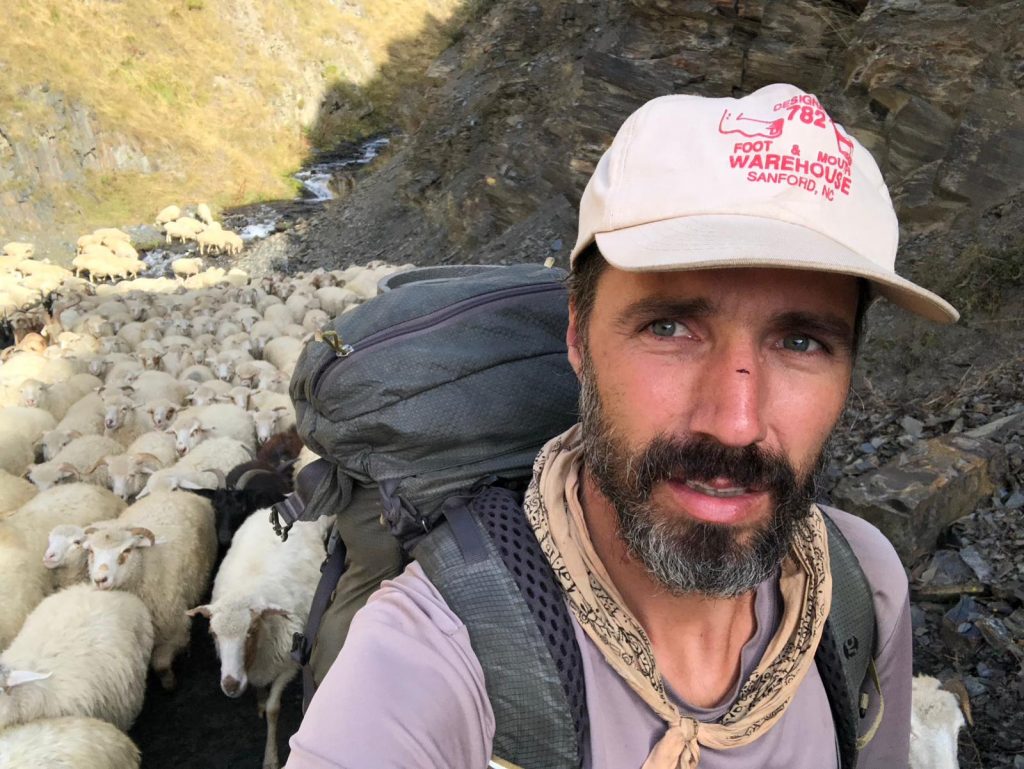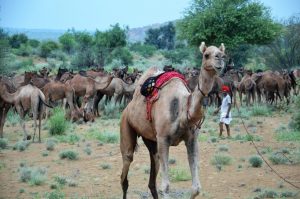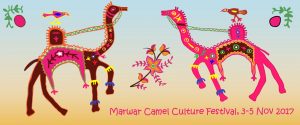 |
A major Indian daily has reported on the Raika delegation’s lobbying visit to Europe in favour of livestock keepers’ rights. “A delegation of ‘Raikas’ (camel breeders) from Rajasthan who visited Europe recently to meet fellow pastoralists and share traditional wisdom on livestock keeping, have returned after successfully convincing the decision-makers at global forums of the need to preserve livestock bio-diversity and indigenous production systems”, reported The Hindu on 17 November 2007. “Attending a series of high-level meetings in Europe, they advocated the rights of herding communities and sought recognition for their role in bio-diversity conservation,” said The Hindu. Full report in The Hindu. |
Archive for 2007
|
Tola Ram Bhil performs in Europe The hills were alive with a different kind of music – the Raika in Switzerland
Meeting a Swiss shepherdess on the mountain trail The Raika with Spanish sheep herds in a rally through the streets of Madrid |
Nomadic pastoralists use drylands in a sustainable and “natural” manner. That is well supported by ecological studies. Keeping animals on the move means they can use seasonal resources and protects vegetation from overgrazing. In drought-prone Rajasthan, mobile livestock keeping is a traditional way to use the land – though government policies are not kind to this way of life. Recently a group of Raika – a prominent pastoralist group in Rajasthan – had the chance to project their traditional knowledge in managing livestock in dry areas to an international audience in three European countries. Composed of Rama Ram, Dailibai, and Mangi Lal Raika, all from Pali District, the delegation was headed by Hanwant Singh, director of Lokhit Pashu-Palak Sansthan. The Raikas were accompanied by Tola Ram Bhil, a musician and bard from Jodhpur. The mission created quite a buzz wherever they went. The purpose of the tour was to raise awareness about the pressures on the pastoralist way of life and the crucial role of pastoralists in managing livestock biodiversity. The tour was arranged by the League for Pastoral Peoples and Endogenous Livestock Development with support from the Christensen Fund. The first stop on the tour was at the headquarters of the League, in the small village of Wembach in Germany. Here the group was surprised to learn that the local shepherd was employed in nature conservation: he used his sheep to maintain the biodiversity of rich patches of land in a government-sponsored programme. The Raika also visited a goat dairy and an organic farm, besides enthralling local media with their trademark red turbans and Tola Ram’s spell-binding music, relating how the first camels were brought to Rajasthan about 700 years ago. The next destination was Switzerland, where the delegation participated in the First International Conference on Animal Genetic Resources and joined other pastoralists in the Animal Diversity Forum, a parallel NGO event that was co-organised by the LIFE Network for community-based management of animal genetic resources and other NGOs. An excursion took them high up into the Alpine meadows where they exchanged experiences with a young woman goat herder who spends the summers in total isolation in the mountain pastures, processing the goat milk into cheese. The final leg of the trip was to Spain to attend a Global Gathering of Pastoralists organised by the Spanish shepherd association. In Spain too, there is recognition of the value of pastoralism for biodiversity conservation, and the century-old system of transhumance between the coastal lowlands and the central plateau has been revived. Traditional passageways for sheep, hundreds of feet wide, are once again being used. The right of shepherds to drive their herds through the centre of Madrid has also been re-established, and is occasion for a big annual festival. This year, the Spanish sheep herds were joined by the over 200 pastoralists in their rally through Madrid. The rally ended on the Plaza Mayor in front of the city administration. Dozens of journalists were waiting to get quotes and sound bites from the pastoralists. The Raika rounded off their eventful trip with a side-event at a meeting of the United Nations Convention to Combat Desertification, where they organised a side-event on “The Role of Pastoralists in Conserving Biodiversity”, showing the Film “Keepers of Genes. India’s Pastoralists and their Breeds”. The Raika were not only excellent ambassadors for their home country, but brought back many lasting impressions. According to Rama Ram, the most useful learning was how highly valued pastoralism is in Europe as a tool for nature conservation and a source of specialty products. |
|
Raika herders (photo: San Francisco Chronicle / Zackary Canepari) |
A visit by a delegation of Raika pastoralists to an international conference in Switzerland has attracted worldwide media coverage. The four Raika delegates attended the Interlaken conference on animal genetic resources in September 2007. Their visit highlighted threats to their livelihood caused by the loss of grazing lands and other rights. Articles in the San Francisco Chronicle in the USA, and the Tageszeitung, Frankfurter Allgemeine and Darmstädter Echo newspapers in Germany focused on the life of the herders and the loss of grazing lands to crop cultivation, industry and forest conservation. “This is definitely a very serious problem,” K.M.L. Pathak, director of the National Research Center on Camels in Rajasthan is quoted by the San Francisco Chronicle. “The grazing area is shrinking day by day.” “If the government doesn’t open up this forest, then we and our camels are finished,” the same paper quotes herder Bhawerlal Raika. “His rights to the grazing lands, as well as the routes that take him there, are sealed in tradition rather than in legal documents, making him a bystander as the most important asset of his centuries-old culture vanishes,” says the Chronicle. |
 |
A group of Raika herders from Rajasthan, India, will be leaving on 26th August for Europe to speak up about their rights at a series of international gatherings dealing with issues crucial to the continuation of their traditional livelihoods. The Raika are the nomadic camel and sheep breeders of Rajasthan who are famous for having created some of the country’s best livestock breeds, but whose future is on the brink, as their traditional pastures are dwindling away. The government has been given preference to irrigation agriculture, and is now in the process of allotting so-called wastelands – that actually represent customary grazing areas – for bio-diesel cultivation. From 1-7 September, the delegation will attend the First International Conference on Animal Genetic Resources in Interlaken (Switzerland), together with more than 200 government delegates from around the world. This conference has been convened by the Food and Agriculture Organization (FAO) of the United Nations to discuss strategies for countering the dramatic rate of extinction of farm animal breeds that is regarded as a threat to future food security. The reason for this trend, among others, is that industrialized livestock farming systems are expanding while the farmers and herders that keep locally adapted breeds are being squeezed out. The goal of the Raika and other representatives of herding cultures is to convince the governments that they should be given an official role in efforts to conserve animal genetic resources. They emphasize that many breeds will only survive, if they themselves are given grazing rights and are lobbying for reference to Livestock Keepers’ Rights in the official documents of the meeting. Livestock Keepers Rights are a bundle of rights or principles that would ensure that traditional livestock keepers can continue to make a living from their animals and thereby sustain the diverse breeds that compose biodiversity and are considered essential for long-term human food security. While African countries have strongly supported inclusion of Livestock Keepers Rights, other countries have not taken up the issue, and the term remains “bracketed” (subject to further discussion). From 8-12 September, the Raika will attend an International Gathering of Nomads and Pastoralists held near Segovia in Spain. They will also participate in a meeting convened in Madrid by the governments that have signed the United Nations Convention on Combating Desertification (UNCCD) to emphasize that pastoralism (or herding) makes an important contribution to conserving biodiversity in drylands. While scientists have accumulated evidence for the positive interlinkage between grazing and biodiversity, the UNCCD has not yet acknowledged this connection. The group composed of Mangilal Raika, Ramu Ram Raika and Srimati Daili Devi Raika will be accompanied by Tola Ram Bhil, a Bhopa (traditional musician) who is specialized in performing the story of how their ancestor, Harmel Ram Raika, brought the first female camels to Rajasthan. The tour is facilitated by the NGO Lokhit Pashu-Palak Sansthan, whose director, Hanwant Singh Rathore will act as translator for the group. On the way to Switzerland, the group will spend time in Germany at the invitation of the League for Pastoral Peoples and Endogenous Livestock Development, an organization that is supporting pastoralists and other marginalized livestock keepers throughout the world through training and advocacy for favourable policy frameworks. In Germany, the Raika will interact with local sheep and cattle herders and learn from them about the use of herding animals in nature conservation. In many countries in Europe, grazing with sheep and other species is used to conserve certain cultural landscapes as well as types of plants, and therefore supported by the government. Contacts Hanwant Singh Rathore, Lokhit Pashu-Palak Sansthan (India), www.lpps.org, mobile +94-148-18564; phone +94-2934-285086 Ilse Koehler-Rollefson, League for Pastoral Peoples (Germany), www.pastoralpeoples.org, +49-6154-53642, ilse@pastoralpeoples.org |
|
June 17th, the United Nations World Day to Combat Desertification, is the day that 14 organizations from around the world are launching a joint initiative called Drynet. LPPS is the partner organisation of this project in India. Drynet is concerned with:
This European Union-funded project aims to strengthen civil society networks, such as farmers’ collectives, indigenous groups, women’s organisations, trade unions and non-governmental organisations with knowledge and visibility to influence dryland development policies in affected countries. Other partner organisations are from Iran, Turkey, Pakistan, Bolivia, Brazil, Chile, Mauritania, South Africa, Senegal, Kazakhstan, the Netherlands, France and Germany. BothEnds, an organisation based in the Netherlands, coordinates the project. Globally, close to one billion people directly depend upon drylands. Climate changes and unsustainable use are causing land to degrade faster than ever. Drylands constitute about 67% (223 million ha) of India’s area, and degradation and desertification affect nearly one-third of this. Communities in developing countries often bear the heaviest cost of these problems. Yet it is possible to make a difference. Local organisations and individuals in many parts of the world have developed ways to adapt to or mitigate the effects the desertification. Such successes need to be brought to the attention of policy makers and other stakeholders. As part of Drynet, LPPS will publicise work by civil society organisations in India, highlight good practices and innovations, and share experiences with agencies elsewhere. The Drynet website (www.dry-net.org) will provide text and multimedia content such as radio programmes. What you can do
Full press release |






 This text in Word format
This text in Word format

 37 kb
37 kb


